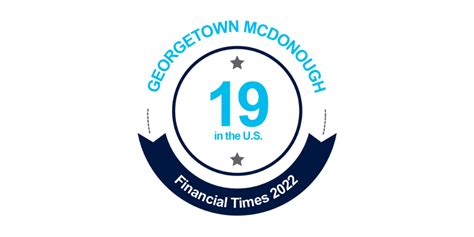Georgetown University’s McDonough School of Business consistently ranks among the top business schools in the nation and the world. Its undergraduate and graduate programs have earned accolades for their academic excellence, faculty expertise, and career outcomes.

Undergraduate Business Programs
U.S. News & World Report:
* No. 18 in Best Undergraduate Business Programs (2023)
* No. 12 in International Business (2023)
Bloomberg Businessweek:
* No. 20 in Best Undergraduate Business Schools (2022)
Financial Times:
* No. 22 in Master’s in Management Ranking (2022)
Graduate Business Programs
U.S. News & World Report:
* No. 15 in Best Part-time MBA Programs (2023)
* No. 19 in Best Global MBA Programs (2023)
* No. 20 in Best Full-time MBA Programs (2023)
Bloomberg Businessweek:
* No. 38 in Best MBA Programs (2022)
* No. 12 in Best Executive MBA Programs (2022)
Financial Times:
* No. 14 in Global MBA Ranking (2022)
* No. 20 in Executive MBA Ranking (2022)
Key Factors Contributing to Georgetown’s Ranking
- Academic Excellence: Georgetown’s faculty is renowned for its research and teaching prowess, resulting in innovative curriculum and real-world case studies.
- Industry Connections: The school has strong relationships with leading corporations and organizations, providing students with hands-on experience and networking opportunities.
- Career Services: McDonough’s extensive career services department helps students secure internships, job placements, and professional development.
- Location: Georgetown’s campus is situated in the heart of Washington, D.C., a global hub for business and policy.
- Diversity: The school’s diverse student body and faculty foster a global perspective and a collaborative learning environment.
Tips for Applying to Georgetown Business Programs
- Maintain a Strong Academic Record: Focus on earning high grades in your core business courses and overall GPA.
- Score Well on Standardized Tests: Prepare thoroughly for the GMAT or GRE and aim for a competitive score.
- Craft a Compelling Profile: Showcase your leadership experience, extracurricular activities, and personal passions that align with Georgetown’s values.
- Seek References: Request letters of recommendation from professors or supervisors who can attest to your academic ability and work ethic.
- Attend Admissions Events: Attend webinars, virtual chats, and campus visits to learn more about Georgetown’s programs and connect with admissions representatives.
Pros and Cons of Georgetown Business Programs
Pros:
- Prestigious reputation and strong brand recognition
- Excellent faculty and academic resources
- Extensive career services and alumni network
- Optimal location for business and policy internships
- Emphasis on ethics and social responsibility
Cons:
- High tuition and fees
- Competitive admissions process
- Limited scholarship opportunities
- Urban campus may not be ideal for all students
- Some large class sizes
Frequently Asked Questions (FAQs)
1. What is Georgetown’s acceptance rate for business programs?
The acceptance rates vary depending on the program. In general, the undergraduate business program has an acceptance rate of around 10-15%, while the graduate business programs have acceptance rates between 20-30%.
2. What are the average GMAT/GRE scores for admitted students?
For the undergraduate business program, the average GMAT score is 690 and the average GRE score is 323. For the graduate business programs, the average GMAT score ranges between 640-680 and the average GRE score ranges between 315-325.
3. What is the career placement rate for Georgetown Business graduates?
According to Georgetown’s website, the career placement rate for recent graduates is over 90%.
4. What is the average starting salary for Georgetown Business graduates?
The average starting salary for graduates from the undergraduate business program is around $60,000, while the average starting salary for graduates from the graduate business programs is around $100,000.
5. Does Georgetown Business offer financial aid?
Yes, Georgetown Business offers a variety of financial aid options, including scholarships, grants, and loans.
6. What are the career paths for Georgetown Business graduates?
Graduates from Georgetown Business pursue careers in various fields, including finance, consulting, management, marketing, and entrepreneurship.
7. What are the main industries that Georgetown Business graduates enter?
The main industries that Georgetown Business graduates enter include financial services, consulting, technology, healthcare, and government.
8. How does Georgetown Business prepare students for international careers?
Georgetown Business offers a number of programs and resources to prepare students for international careers, including the Global Business Practicum, the International Business Immersion Course, and the Global Executive MBA program.
